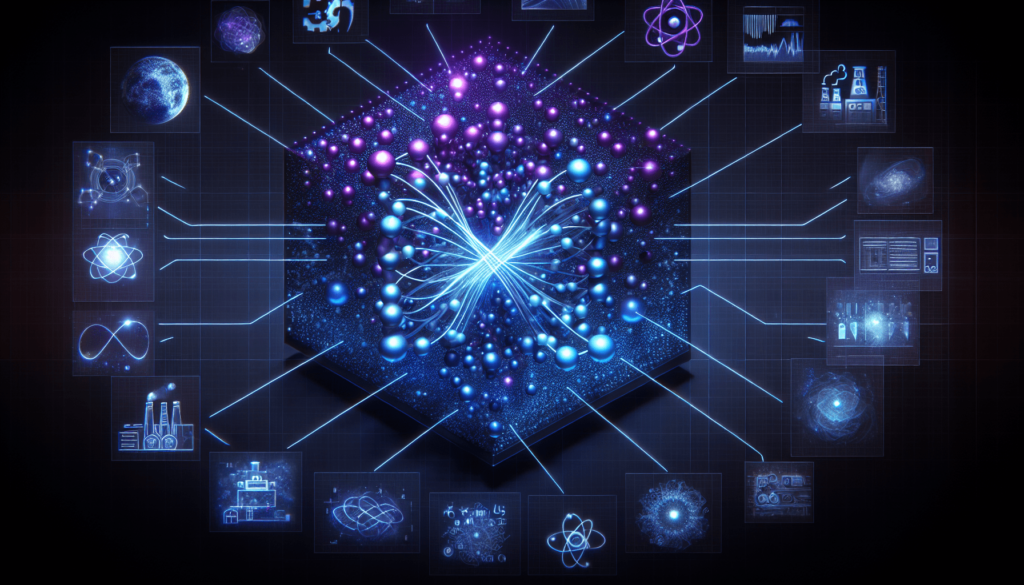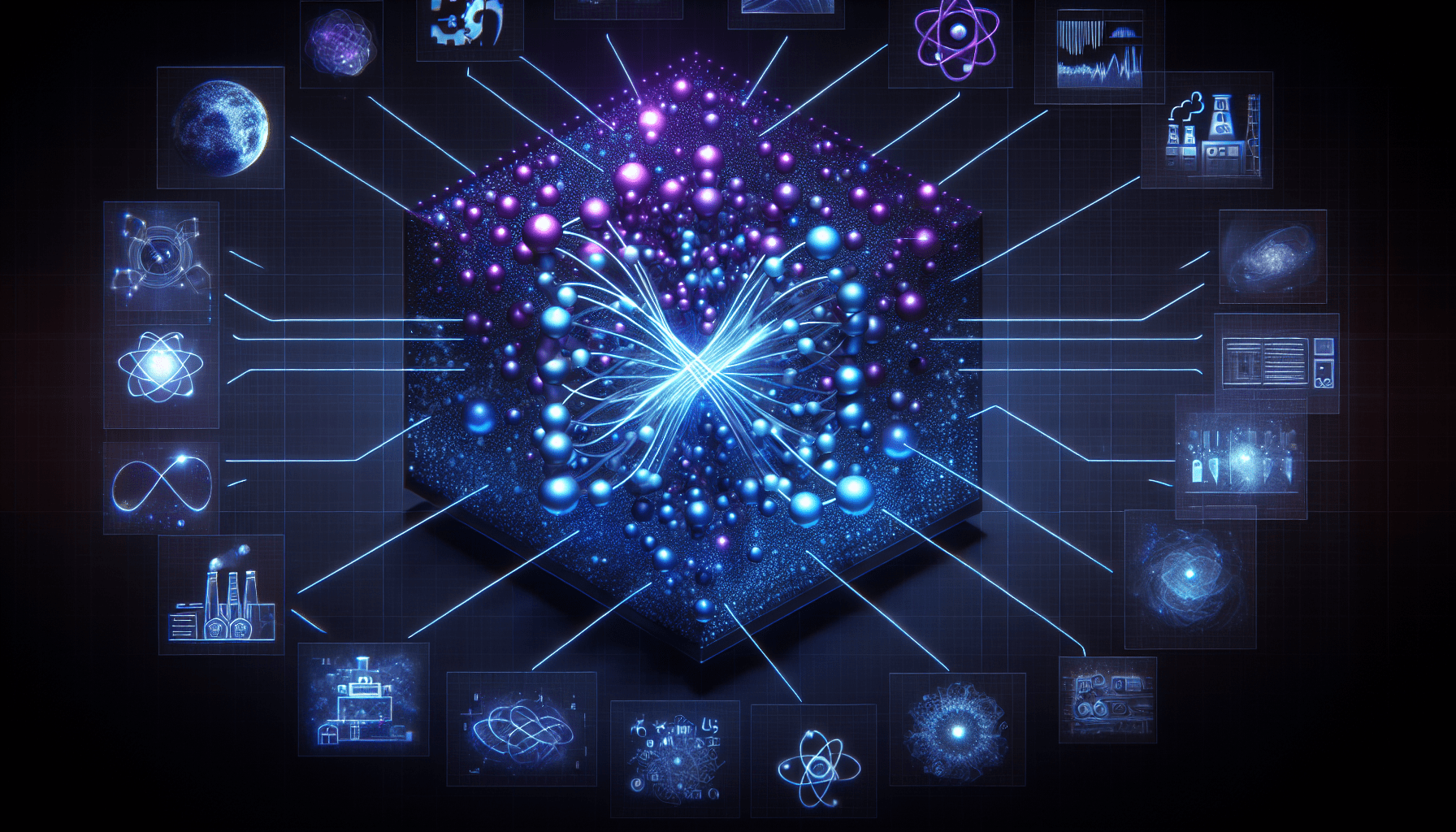In this article, we will explore the fascinating world of quantum AI. You may have heard the term before, but do you really know what it means? Quantum AI combines the principles of quantum mechanics and artificial intelligence to create a powerful and potentially revolutionary technology. Get ready to unlock the secrets of this cutting-edge field and discover how Quantum AI could shape the future of computing and problem-solving. So, buckle up and prepare to embark on an exciting journey into the world of Quantum AI!

What is Quantum AI?
Definition of Quantum AI
Quantum AI refers to the integration of quantum computing and artificial intelligence (AI) techniques to enhance computational power and solve complex problems. It is a field that leverages the principles of quantum mechanics to improve AI algorithms and data analysis. By harnessing the unique properties of quantum systems, such as superposition and entanglement, Quantum AI aims to revolutionize the capabilities of AI technology.
Integration of Quantum Computing and Artificial Intelligence
The integration of quantum computing and artificial intelligence brings together two cutting-edge fields to create a synergy that can revolutionize various industries. Quantum computing offers advantages over classical computing by leveraging quantum bits, or qubits, which can exist in multiple states simultaneously. This enables exponentially higher computational power, which can be harnessed to process and analyze large datasets, optimize complex problems, and enhance machine learning algorithms.
Key Concepts in Quantum AI
Quantum AI encompasses several key concepts that underpin its applications. These concepts include quantum machine learning, quantum neural networks, quantum algorithms for optimization, and quantum data analysis. Each of these areas leverages the unique properties of quantum systems to bring advancements and enhancements to AI.
Definition of Quantum AI
Basic explanation of Quantum AI
Quantum AI can be understood as the combination of quantum mechanics and artificial intelligence. It seeks to leverage the principles of quantum systems to enhance AI algorithms and data analysis. By harnessing the quantum properties of superposition and entanglement, Quantum AI aims to address the limitations of classical computing and drive advancements in AI technology.
Combination of quantum mechanics and artificial intelligence
Quantum AI integrates the principles of quantum mechanics, which describe the behavior of particles at the microscopic level, with artificial intelligence techniques. By combining these two fields, researchers hope to develop novel algorithms and approaches that can process and analyze data more efficiently and accurately than classical computing methods.
Harnessing quantum properties for AI algorithms
One of the main goals of Quantum AI is to utilize the unique properties of quantum systems, such as superposition and entanglement, to improve AI algorithms. Superposition allows qubits to exist in multiple states simultaneously, enabling parallel processing and exponentially higher computational power. Entanglement, on the other hand, allows qubits to be correlated even when physically separated, enabling faster and more efficient communication between quantum systems. By harnessing these quantum properties, Quantum AI aims to enhance the performance and efficiency of AI algorithms.
Integration of Quantum Computing and Artificial Intelligence
Synergy between quantum computing and AI
The integration of quantum computing and AI brings together two fields that can mutually benefit from each other. Quantum computing offers enhanced computational power that can accelerate AI algorithms and enable the processing of larger datasets. On the other hand, AI techniques can help in optimizing quantum algorithms and analyzing the output of quantum systems. This synergy between the two fields creates new opportunities for solving complex problems and advancing AI technology.
Advantages of quantum computing for AI
Quantum computing offers several advantages over classical computing when applied to AI tasks. Classical computers process data sequentially, while quantum computers can simultaneously process multiple states of data due to the principle of superposition. This parallel processing capability of quantum computers can significantly speed up AI algorithms and enable the handling of large datasets more efficiently. Quantum computers also have the potential to solve exponentially large problems that are currently intractable using classical computing methods.
Enhanced computational power for complex problems
One of the key benefits of integrating quantum computing and AI is the enhanced computational power that can be harnessed to solve complex problems. Quantum computers can perform calculations at a scale and speed that is beyond the reach of classical computers. This can have significant applications in fields such as optimization, cryptography, drug discovery, and financial modeling, where complex calculations are required. By leveraging the power of quantum computing, AI algorithms can tackle increasingly complex problems and provide more accurate results.
Key Concepts in Quantum AI
Quantum machine learning
Quantum machine learning is an emerging field that aims to leverage quantum properties for machine learning tasks. It explores the potential of quantum algorithms to enhance the performance and efficiency of machine learning algorithms. By utilizing the principles of superposition and entanglement, quantum machine learning algorithms have the potential to process and analyze data more effectively than classical machine learning methods.
Quantum neural networks
Quantum neural networks are a variant of classical neural networks that utilize quantum gates and qubits to perform computations. These networks leverage the parallelism and complex interactions inherent in quantum systems to process and analyze data. While still in the early stages of development, quantum neural networks hold promise for improving pattern recognition, optimization, and machine learning tasks.
Quantum algorithms for optimization
Optimization problems are prevalent in various fields, such as logistics, finance, and engineering. Quantum algorithms for optimization aim to leverage the computational power of quantum systems to find optimal solutions more quickly and efficiently. By exploiting the principles of quantum mechanics, such as superposition and entanglement, quantum algorithms can provide speedup and performance gains over classical optimization algorithms.
Quantum data analysis
Quantum data analysis focuses on handling and analyzing large datasets using quantum techniques. By employing quantum algorithms and principles, such as quantum Fourier transform and quantum phase estimation, it aims to provide more efficient and accurate data analysis methods. Quantum data analysis has the potential to bring improvements in fields such as big data analytics, image recognition, and natural language processing.

Quantum Machine Learning
Utilizing quantum properties for machine learning tasks
Quantum machine learning aims to leverage the unique properties of quantum systems, such as superposition and entanglement, to enhance machine learning tasks. By utilizing quantum algorithms and techniques, it seeks to improve the efficiency, accuracy, and scalability of machine learning algorithms. Quantum machine learning has the potential to revolutionize various applications, including pattern recognition, data classification, and optimization.
Enhanced performance and efficiency
One of the main advantages of quantum machine learning is its potential to provide enhanced performance and efficiency compared to classical machine learning algorithms. Quantum algorithms can exploit the parallel processing capabilities of quantum systems, allowing for faster and more efficient computations. Additionally, quantum algorithms can handle larger datasets more effectively, providing more accurate results and insights.
Potential applications of quantum machine learning
Quantum machine learning holds promise for various applications across different industries. In healthcare, it can be utilized for drug discovery, personalized medicine, and disease diagnosis. In finance, quantum machine learning can assist in portfolio optimization, fraud detection, and risk assessment. Other potential applications include image recognition, natural language processing, recommendation systems, and autonomous vehicles. The combination of quantum properties and machine learning techniques opens up new possibilities for solving complex problems and advancing technology.
Quantum Neural Networks
Quantum-inspired neural networks
Quantum neural networks are a variation of classical neural networks that draw inspiration from the principles of quantum mechanics. Unlike classical neural networks, which use binary bits, quantum neural networks use qubits as the basic computational units. These qubits can represent multiple states simultaneously, allowing for parallel computations. This parallelism can lead to improved performance and efficiency in solving complex problems.
Utilizing quantum gates and qubits
Quantum neural networks leverage quantum gates and qubits to perform computations. Quantum gates allow for the manipulation of qubits, enabling the creation of complex interactions and computations. By using qubits instead of classical binary bits, quantum neural networks have the potential to process and analyze data more effectively, leading to improved accuracy and performance. However, quantum neural networks are still in the early stages of development and face challenges in terms of hardware limitations and error correction.
Advantages and challenges of quantum neural networks
There are several potential advantages of quantum neural networks. They have the potential to provide exponential speedup compared to classical neural networks for certain tasks, such as solving optimization problems. Quantum neural networks can also handle complex and nonlinear patterns more effectively, making them suitable for tasks like image recognition and natural language processing. However, quantum neural networks face challenges in terms of hardware limitations, error correction, and scalability. Overcoming these challenges is crucial for realizing the full potential of quantum neural networks.
Quantum Algorithms for Optimization
Optimization problems in various fields
Optimization problems are common across various fields, including logistics, finance, energy, and manufacturing. These problems involve finding the best solution from a set of possible solutions, considering certain constraints and objectives. Classical optimization algorithms have limitations in solving large-scale, complex optimization problems within a reasonable time frame. Quantum algorithms for optimization aim to overcome these limitations and provide faster and more efficient solutions.
Quantum algorithms for solving optimization problems
Quantum algorithms, such as the Quantum Approximate Optimization Algorithm (QAOA) and the Quantum Annealing (QA) algorithm, have been proposed for solving optimization problems. These algorithms leverage the principles of quantum mechanics, such as superposition and entanglement, to explore the solution space more effectively. Quantum algorithms for optimization have the potential to find optimal solutions more quickly compared to classical optimization algorithms, leading to improved efficiency and performance in solving complex optimization problems.
Speedup and performance gains
One of the key advantages of quantum algorithms for optimization is their potential for providing speedup and performance gains. Quantum algorithms can explore the solution space in parallel, allowing for faster convergence to optimal solutions. This speedup can be particularly beneficial for large-scale optimization problems with numerous variables and constraints. By harnessing the computational power of quantum systems, these algorithms offer the promise of tackling previously intractable optimization problems and improving decision-making processes in various fields.
Quantum Data Analysis
Handling and analyzing large datasets using quantum techniques
Quantum data analysis focuses on leveraging quantum techniques and algorithms to handle and analyze large datasets more efficiently. The exponential growth of data in various industries has created a need for more powerful and scalable data analysis methods. Quantum data analysis explores the potential of quantum systems, including quantum algorithms and quantum machine learning techniques, to process and analyze data more effectively.
Potential improvements in data analysis
Quantum data analysis has the potential to provide improvements in various aspects of data analysis. By leveraging the principles of quantum mechanics, such as quantum parallelism and quantum superposition, quantum algorithms can process larger datasets more efficiently and effectively. This can lead to improved accuracy, faster insights, and enhanced decision-making capabilities. Quantum data analysis also has the potential to uncover hidden patterns and correlations in data, offering new opportunities for knowledge discovery and predictive modeling.
Application in various industries
The application of quantum data analysis can have significant implications across various industries. In fields such as finance, quantum data analysis can enable faster and more accurate risk assessment, fraud detection, and portfolio optimization. In healthcare, it can assist in personalized medicine, drug discovery, and disease diagnosis. Other potential applications include climate modeling, supply chain optimization, cybersecurity, and social network analysis. Quantum data analysis has the potential to revolutionize data-driven decision-making processes and drive advancements in various industries.
Current Challenges and Limitations
Technical hurdles in implementing Quantum AI
The implementation of Quantum AI faces several technical challenges. Building and maintaining stable and coherent qubits, which are the basic units of quantum computation, is a significant challenge. Noise and decoherence can degrade the performance of quantum systems, leading to errors in computations. Overcoming these technical hurdles requires advancements in quantum hardware, error correction techniques, and noise suppression methods.
Limited availability of quantum hardware
Another challenge in implementing Quantum AI is the limited availability of reliable and scalable quantum hardware. Quantum computers are still in the early stages of development and are currently limited in terms of the number of qubits and their stability. The scarcity of quantum hardware restricts the practical implementation of Quantum AI algorithms and limits their scalability. However, advancements in quantum technology are being made, and it is expected that the availability of quantum hardware will improve over time.
Overcoming noise and errors in quantum computing
Noise and errors are inherent in quantum computing due to interactions with the environment and imperfections in the quantum systems. These errors can lead to inaccuracies in computations, limiting the reliability and performance of quantum algorithms. Overcoming noise and errors in quantum computing requires the development of error correction codes, fault-tolerant techniques, and efficient error mitigation methods. Addressing these challenges is crucial for the practical implementation of Quantum AI and ensuring the accuracy and reliability of quantum computing systems.
Future Prospects of Quantum AI
Advancements in quantum technology
The future of Quantum AI holds great promise with advancements in quantum technology. As quantum hardware becomes more reliable and scalable, researchers will have access to more computational power for implementing Quantum AI algorithms. Continued progress in areas such as qubit stability, error correction, and noise suppression will contribute to the practical implementation of Quantum AI and drive its advancements.
Potential breakthroughs in AI with quantum computing
Quantum computing has the potential to provide breakthroughs in various AI tasks. The enhanced computational power offered by quantum systems can accelerate the training of machine learning models, enable more accurate predictions, and solve optimization problems more efficiently. By combining the strengths of quantum computing and AI, researchers anticipate significant advancements in natural language processing, image recognition, recommendation systems, and other AI applications. Quantum AI has the potential to reshape the AI landscape and unlock new possibilities for technology and innovation.
Implications for various industries
The integration of quantum computing and AI holds significant implications for various industries. The enhanced computational power, improved data analysis techniques, and optimization capabilities offered by Quantum AI can bring transformative changes to fields such as finance, healthcare, logistics, energy, and manufacturing. Quantum AI has the potential to drive advancements in personalized medicine, financial modeling, supply chain optimization, and climate modeling, among others. The future prospects of Quantum AI are closely tied to the advancements in quantum technology and its practical implementation in real-world applications.
In conclusion, Quantum AI represents an exciting field that combines the principles of quantum mechanics and artificial intelligence to enhance computational power and solve complex problems. The integration of quantum computing and AI brings together two fields that can mutually benefit from each other, creating new opportunities for technological advancements. With concepts such as quantum machine learning, quantum neural networks, quantum algorithms for optimization, and quantum data analysis, Quantum AI aims to revolutionize various industries and reshape the capabilities of AI technology. While there are challenges and limitations in implementing Quantum AI, advancements in quantum technology and breakthroughs in AI with quantum computing hold tremendous potential for the future. The implications of Quantum AI for various industries are vast, and it is expected to drive innovation and unlock new possibilities in the years to come.
